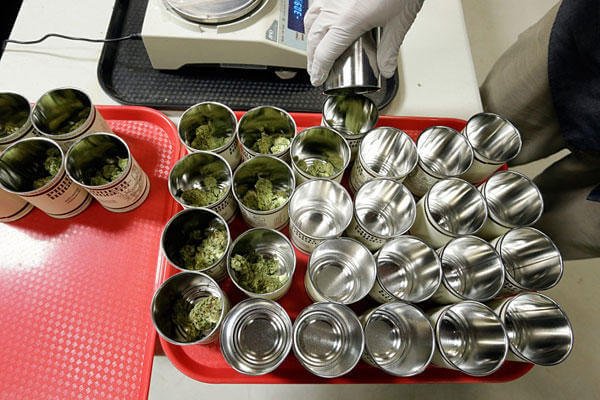The White House has lifted a major obstacle long standing in the way of studies into the use of pot to treat victims of post-traumatic stress disorder and other ailments.
The Health and Human Services Department has published in the Federal Register its announcement eliminating Public Health Service reviews of marijuana research projects not funded by the government.
"The significance is that the Obama Administration is making formal a decision that they made informally more than a year ago," said Rick Doblin, executive director of Multidisciplinary Association for Psychedelic Studies, which plans to conduct a study whose test subjects include 76 veterans.
The Veterans Affairs Department estimates that between 11 and 20 percent of Iraq and Afghanistan war veterans suffer from PTSD. For veterans of the Persian Gulf War, the estimate is 12 percent, and for Vietnam veterans, 15 percent.
The Public Health Service granted review approval to the association in March 2014, but also noted in its letter that what it had previously set down as requirements for approval were now suggestions.
The latest move, Doblin said, signals "the Obama Administration is open to ending federal obstruction of privately-funded medical marijuana drug development research."
HHS in a statement said it was aware that the Public Health Service review "is perceived to be an obstacle to non-federally funded research" and so eliminated it as a requirement.
"The Department expects the action … will help facilitate further research to advance our understanding about the health risks and any potential benefits of medications using marijuana or its components or derivatives, as well as the health implications of other uses of marijuana," the statement said.
HHS took the step after its officials, along with those of the National Institutes of Health and the Food and Drug Administration, concluded that there was enough "overlap" between the two reviews as to make unnecessary the Public Health Service requirement, which has been in place since 1999.
According to Doblin, the reviews offered nothing to advance the kinds of studies his association and others might undertake.
"The PHS reviewers come from the world of basic science, seeking knowledge about how things work. The FDA reviewers come from the perspective of drug development, where you don't need to know how things work, you just have to prove safety and efficacy," Doblin said. "There was a mismatch between the approaches of the different reviewers which ended up with the PHS reviewers rejecting multiple FDA-approved protocols."
Doblin said another important step that must be taken is to end the National Institute of Drug Abuse's monopoly on the production of Drug Enforcement Agency-licensed marijuana that can be used in FDA-regulated research.
The move helps clear the way for an oft-delayed study into the use of marijuana in treating veterans with PTSD, Doblin said.
The administration's decision also comes one month after a bipartisan group of lawmakers wrote Health and Human Services Secretary Sylvia Mathews Burwell demanding an end to the requirement for a review by the Public Health Service.
Marijuana is the only Schedule 1 drug for which independent research had required such a review, according to Americans for Safe Access, a group dedicated to ensuring safe and legal access to pot for medical research.
Though the government approved the MAPS study well over a year ago, research has been delayed, in part because the University of Arizona, designated as one of two testing sites, without explanation fired lead researcher, Dr. Suzanne Sisley shortly after it won approval.
The university reportedly terminated Sisley under pressure from Arizona lawmakers opposed to the study.
In a statement released on Monday, Sisley said the government "has systemically impeded marijuana efficacy research, and the PHS review has played a large role in that stonewalling … To see the government finally eliminate this waste of taxpayer dollars is a triumph and hopefully represents another historic shift in drug policy reform."
Doblin said there is still one more hurdle: ending the National Institute of Drug Abuse's "monopoly" on the production of marijuana that can be used in Food and Drug Administration-regulated research.
He said the marijuana made available by NIDA can be used for research, "but not for prescription use," which means the pot will not meet FDA requirement that "studies be conducted with the exact same drug for which marketing approval is being sought."
He said MAPS will soon begin working in July with Lyle Craker, a professor in the Department of Plant, Soil and Insect Sciences at the University of Massachusetts Amherst, to apply to the DEA for a license to grow marijuana specifically for federally regulated research purposes.
Craker has been trying for about a decade to get that permission from the DEA, so far without success.
--Bryant Jordan can be reached at bryant.jordan@military.com



























